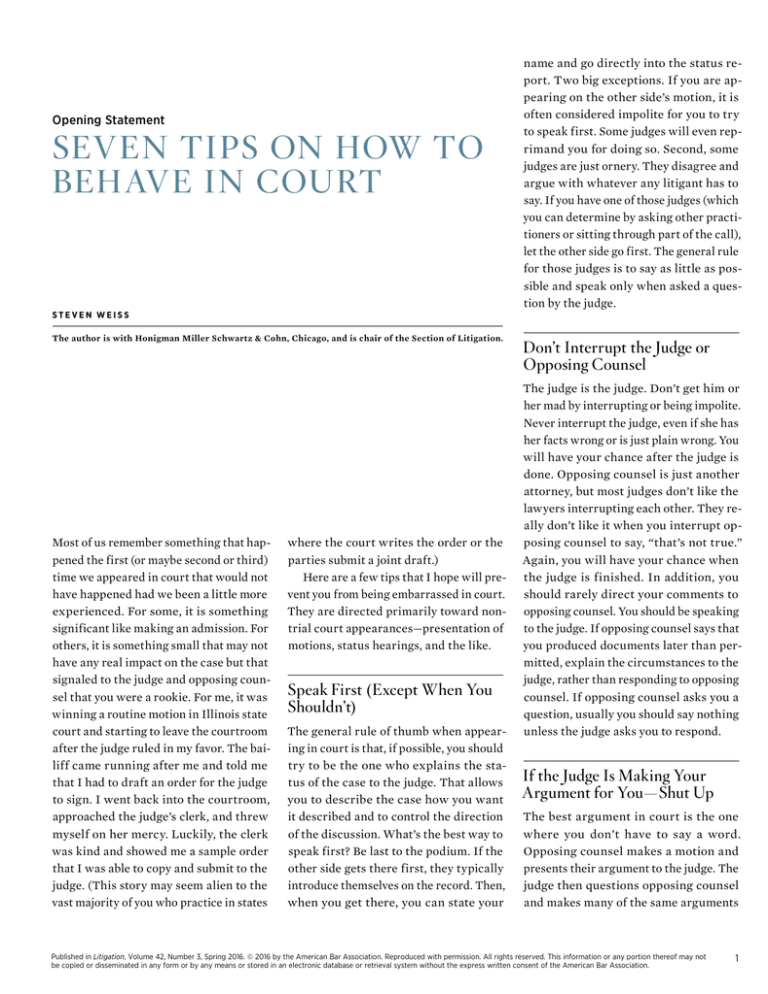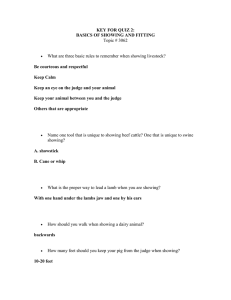
Opening Statement
Sev en Tips on How to
Behav e in Court
S t e v e n W e i ss
The author is with Honigman Miller Schwartz & Cohn, Chicago, and is chair of the Section of Litigation.
Most of us remember something that happened the first (or maybe second or third)
time we appeared in court that would not
have happened had we been a little more
experienced. For some, it is something
significant like making an admission. For
others, it is something small that may not
have any real impact on the case but that
signaled to the judge and opposing counsel that you were a rookie. For me, it was
winning a routine motion in Illinois state
court and starting to leave the courtroom
after the judge ruled in my favor. The bailiff came running after me and told me
that I had to draft an order for the judge
to sign. I went back into the courtroom,
approached the judge’s clerk, and threw
myself on her mercy. Luckily, the clerk
was kind and showed me a sample order
that I was able to copy and submit to the
judge. (This story may seem alien to the
vast majority of you who practice in states
where the court writes the order or the
parties submit a joint draft.)
Here are a few tips that I hope will prevent you from being embarrassed in court.
They are directed primarily toward nontrial court appearances—presentation of
motions, status hearings, and the like.
Speak First (Except When You
Shouldn’t)
The general rule of thumb when appearing in court is that, if possible, you should
try to be the one who explains the status of the case to the judge. That allows
you to describe the case how you want
it described and to control the direction
of the discussion. What’s the best way to
speak first? Be last to the podium. If the
other side gets there first, they typically
introduce themselves on the record. Then,
when you get there, you can state your
name and go directly into the status report. Two big exceptions. If you are appearing on the other side’s motion, it is
often considered impolite for you to try
to speak first. Some judges will even reprimand you for doing so. Second, some
judges are just ornery. They disagree and
argue with whatever any litigant has to
say. If you have one of those judges (which
you can determine by asking other practitioners or sitting through part of the call),
let the other side go first. The general rule
for those judges is to say as little as possible and speak only when asked a question by the judge.
Don’t Interrupt the Judge or
Opposing Counsel
The judge is the judge. Don’t get him or
her mad by interrupting or being impolite.
Never interrupt the judge, even if she has
her facts wrong or is just plain wrong. You
will have your chance after the judge is
done. Opposing counsel is just another
attorney, but most judges don’t like the
lawyers interrupting each other. They really don’t like it when you interrupt opposing counsel to say, “that’s not true.”
Again, you will have your chance when
the judge is finished. In addition, you
should rarely direct your comments to
opposing counsel. You should be speaking
to the judge. If opposing counsel says that
you produced documents later than permitted, explain the circumstances to the
judge, rather than responding to opposing
counsel. If opposing counsel asks you a
question, usually you should say nothing
unless the judge asks you to respond.
If the Judge Is Making Your
Argument for You—Shut Up
The best argument in court is the one
where you don’t have to say a word.
Opposing counsel makes a motion and
presents their argument to the judge. The
judge then questions opposing counsel
and makes many of the same arguments
Published in Litigation, Volume 42, Number 3, Spring 2016. © 2016 by the American Bar Association. Reproduced with permission. All rights reserved. This information or any portion thereof may not
be copied or disseminated in any form or by any means or stored in an electronic database or retrieval system without the express written consent of the American Bar Association.
1
that you would make. Unless the judge
asks you to respond, keep quiet. Lawyers
like to hear themselves speak, but if the
judge will do it for you, you are much better off. I have seen judges say to counsel,
“I have already made up my mind in your
favor. Are you trying to change my mind?”
Work It Out
There are very few parts of the job that
judges dislike more than discovery disputes. That’s why the Federal Rules, and
most state rules, require that the parties
actually confer on discovery disputes before filing motions, and require that the
lawyers certify what they did to try to
resolve the issue before asking the court
for assistance. Many judges and magistrates take a “pox on both your houses”
approach to discovery disputes. Often,
neither side is happy with the result. Try
to work it out before you go to the court.
Save the motions to compel and motions
for sanctions for serious violations.
Assume Every Motion Will Be
Decided the First Time Up
Each jurisdiction has different rules on
how it deals with motion practice, and
state and federal courts frequently have
different approaches to motions. Some
courts have an automatic briefing schedule and you do not appear in court until
argument on the motion. Other courts
rule exclusively on the written papers and
hear no argument. In still other courts, a
motion is presented to the court, at which
time either a briefing schedule is set or
the judge deals with the merits of the case
at presentment. If you are in that type of a
jurisdiction (as are both federal and state
courts in Illinois), always be prepared to
argue the merits of the motion, even if you
expect that the judge will be entering a
briefing schedule.
In Illinois, there is a growing number of judges who try to rule on motions,
particularly discovery motions, as soon
as they are presented, even without opposing pleadings. You never know when
the judge will have read the initial motion and will want to rule without further briefs. Be prepared, rather than being embarrassed by sending someone
to court who knows nothing about the
case and enabling the other side to argue
and prevail on the motion with minimal
resistance.
Research the Judge
When you are assigned a judge, do some
research. Unless you already know the
judge well, find out what you can about
the judge’s background and history as a
judge. How long has the judge been sitting? Have there been significant decisions by the judge? Research whether the
judge has any reported decisions on the
issues in your case. Talk to other lawyers who have practiced before the judge.
Most bar associations publish evaluations
of the judges. And, most importantly, read
any local rules or other special requirements of your judge. In federal court,
each judge’s preferences and rules are
typically posted on the judge’s website.
In some courts, there are local rules or
Lawyers like to hear
themselves speak, but
if the judge will do it
for you, you are much
better off.
starts every court call by directing all the
lawyers to hang up their coats. One time,
he stepped off the bench and hung up the
coat of someone who was too scared to
identify himself. Know the judge.
A Couple Tips on Trials
I tried to keep these tips limited to nontrial court appearances because trial tips
are a whole different article. However, I
could not resist at least a couple tips about
trials. First, if you say during opening
statements that you will prove something
at trial, make sure you do so. Judges and
juries pay attention to the opening statements. Saying that you will prove something and then not doing so at trial is a disaster. You lose credibility with the judge
or jury, and you allow opposing counsel to
focus on a few facts that, true or not, you
did not prove at trial. Second, use leading questions any time you can. You can
not only control the subject matter and
scope of the question and answer but also
use the words with the connotations you
want. Use leading questions if you can,
and try to phrase them in a way that “yes”
or “no” are the only possible responses.
Some witnesses have trouble saying yes or
no. Leading questions often make those
witnesses appear to be evasive. q
orders that apply to certain courts. Make
sure you know all of those rules and that
you follow them. Finally, talk to someone who has practiced before your judge.
Some have very strange practices. There
is one federal judge who believes that
leaving overcoats in the courtroom, rather than in the closet, is disrespectful. He
Published in Litigation, Volume 42, Number 3, Spring 2016. © 2016 by the American Bar Association. Reproduced with permission. All rights reserved. This information or any portion thereof may not
be copied or disseminated in any form or by any means or stored in an electronic database or retrieval system without the express written consent of the American Bar Association.
2

